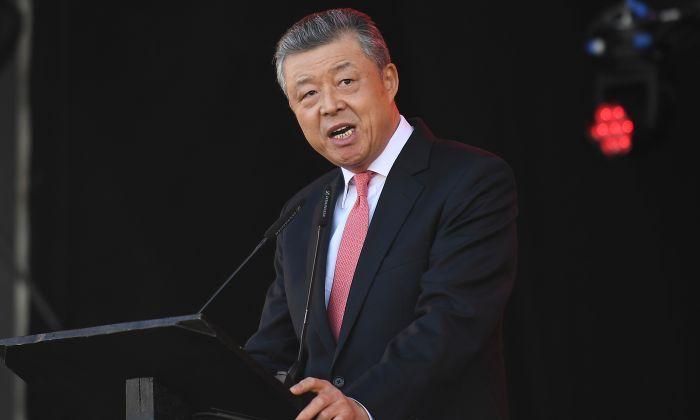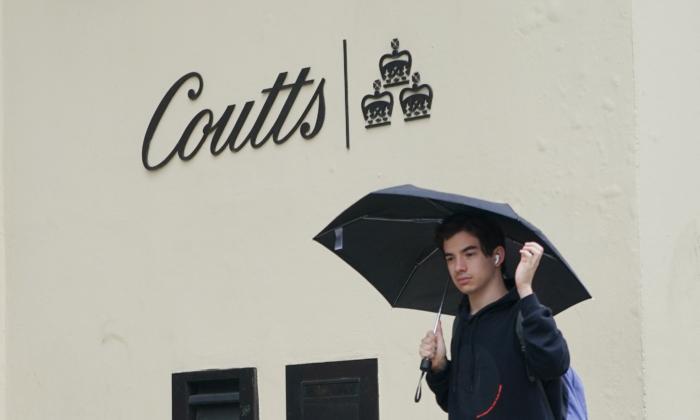China’s embassy to the United Kingdom has claimed Ambassador Liu Xiaoming’s official Twitter account was hacked, after it ‘liked’ an adult video clip on the social media platform.
The ambassador’s account, which has 85,700 followers, attracted attention on Sept. 9 morning when some users discovered that it ‘liked’ a 10-second video of a sex act, which was posted by an adult-themed Twitter account.
Luke de Pulford, a London-based human rights advocate, alerted others to the discovery, posting a screenshot as proof.
“WARNING: DO NOT READ THIS IF EATING,”
wrote de Pulford, who is a member of the British Conservative Party’s Human Rights Commission.
“Felt a bit mean for this,” he said of his post publicly shaming the ambassador. “But then I remembered the #Uyghur concentration camps and #HongKong and quickly got over it,” referring to the Chinese regime’s erosion of freedoms in the regions of
Xinjiang and
Hong Kong.
“Thank God he blocked me,” said Benedict Rogers, chief executive of British NGO Hong Kong Watch. Twitter users are able to block specific users from accessing their account’s content.
“So that’s what he does with his time, when he is not spreading mendacity or harassing critics!” he
wrote on Twitter.
Ambassador Liu’s unusual online behavior was widely lampooned before the account eventually “unliked” the pornographic Twitter post.
Hours later, the Chinese embassy issued an
angry statement, which said, “Recently, some anti-China elements viciously attacked Ambassador Liu Xiaoming’s Twitter account and employed despicable methods to deceive the public.”
The embassy “strongly condemns such abominable behaviour” and has urged Twitter to “make thorough investigations and handle this matter seriously,” the statement said, adding it “reserves the right to take further actions.”
The Epoch Times contacted Twitter via email about the hacking allegation, but has not received a response as of press time.
Liu, 64, has served as Beijing’s top envoy to Britain since 2009. He frequently appears on British TV attacking critics of the Chinese regime and fending off criticism of its abysmal human rights record.
Since joining Twitter last year, Liu has used the platform to attack critics of Beijing’s policies in Xinjiang and Hong Kong; defend the embattled Chinese telecom giant Huawei; and praise the Chinese regime’s response to the
CCP (Chinese Communist Party) virus pandemic.
Like other U.S. social media networks, Twitter is banned in China and Chinese citizens are not free to use the platform even when they travel abroad. In January, a University of Minnesota student was
detained in China and sentenced to six months in prison for tweets he posted while in the United States.
But the Chinese regime has been actively using Twitter and other U.S. social media platforms to ramp up its
influence campaigns in the West.
Chinese diplomats have in recent months
aggressively taken to Twitter to promote the regime as an exemplar in global efforts to contain the CCP virus, and push unfounded claims that the virus did not originate from China. In March, Chinese Foreign Ministry spokesman
Zhao Lijian claimed on his Twitter account that the CCP virus was brought into Wuhan by the U.S. army, prompting U.S. lawmakers to urge Twitter to
ban CCP officials from the platform.
In June, Twitter announced that it had taken down more than
170,000 accounts linked to the Chinese regime that pushed its narratives surrounding the pandemic, Hong Kong protests, and the Black Lives Matter protests in the United States.
Last August, Twitter also
scrubbed hundreds of Beijing-linked accounts that sought to vilify the pro-democracy protest movement in Hong Kong.
Bowen Xiao, Cathy He, and Frank Fang contributed to this report.






Friends Read Free